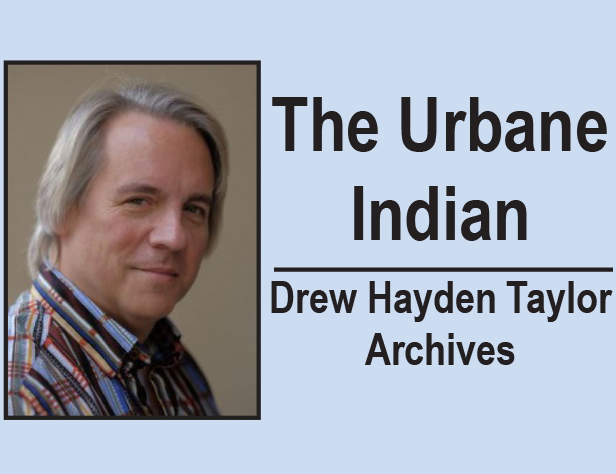
By Drew Hayden Taylor
Originally posted in November 2012
I just recently got back from visiting the great state of Wisconsin. I had been asked to come and speak to a few classes at the Menominee Tribal College about my work and Native literature in general. Overall, I had a great time and met some fabulous people. This is one of the reasons I like to travel so much; the people, places and things you learn.
On this particular trip, other than interesting facts about the Menominee nation–their reservation is the fourteenth poorest county in America–I learned a little more about silencing the storyteller. Specifically, I was updated on the state of censorship in America.
During a trip to the reservation’s library I saw an interesting publication titled “BANNED: Books Challenged or Banned in 2011-12” on the librarian’s desk. As the title suggests, it’s a list of books that have been banned or attempted to be banned in schools across America. Curious, I started leafing through it.
Surprisingly, some of the most amazing books written in North America and the world were considered offensive by a wide group of people. Having been somewhat politically aware and a writer for the last 20 years or so, I knew that this kind of intolerance happened quite frequently but it was still amazing to see it listed on five sheets of paper.
The books listed included “In Cold Blood” by Truman Capote. Considered a seminal work in American literature, a Californian School district attempted to block a request to add the text to the district’s advanced English curriculum. It was considered “too violent.” Luckily, in a school board vote, the request was denied.
“A Study In Scarlet” by Sir Arthur Conan Doyle was also on the list. This was the book that held the first appearance of Sherlock Holmes. This classic novel was removed from a Virginia sixth-grade required reading list because of unflattering references to Mormons.
“The Wars” by Timothy Findley. How about that? Canada made the grade. Challenged, but retained in Bluewater, Ont., several parents found “a number of very explicit and detailed descriptions of sexual encounters, most of them exploitive and violent.”
Welcome to World War One.
“Beloved” by Toni Morrison. This brilliant novel was challenged in Michigan but retained despite complaints regarding the allegedly obscene nature of some of the book’s passages. Luckily district officials “considered the accuracy of the material, the objectivity of the material and the necessity of using the material in light of the curriculum.”
My two favourites: “Romeo And Juliet” by William Shakespeare. Some parents in South Carolina were furious their middle school children were reading this book. They thought it was too mature for their kids because of the sex. “The AbsoluteLy True Diary Of A Part Time Indian” by Sherman Alexie. This no doubt filled the Aboriginal quota of the list. This great book was banned but later returned to a Washington School district’s reading list. The complaint– “coarse themes and language in the young-adult book.” It was also pulled from a Georgia, New Jersey and Massachusetts school reading list for complaints about “vulgarity, racism, and anti-Christian content.
I know parents have a natural inclination to be protective and sheltering of their children, but preventing them from reading great literature might just backfire, limiting their potential psychological development.
Reading opens the world, and if children are prevented from soaking up great stories and books, they might just grow up like their parents, with small minds and xenophobic tendencies.
I would also like to add that I myself came into direct contact with potential censorship during my trip south. The college is run by a nun, and since part of my presentations dealt with the politically incorrect world of Native humour, my class presentation was ratted out to the authorities, and I was told quite emphatically that if my evening performance was rude or offensive I would literally be pulled off the stage.
The odd thing here is that as a writer and lecturer, I am surprisingly one of the most inoffensive. Be that as it may, that night as a guest of the community, I was a good boy…
Or so I thought. I said two things that got me in trouble with one woman in the audience. I said, when asked about my own religious beliefs, “basically, most religions have the same message, they just used different textbooks.” I saw her vigorously shake her head no. Then after the reading, she came up to look at my books for sale. She picked up a play about two brothers called “In A World Created By A Drunken God”, and dropped it, saying as she walked away, “May God have mercy on your soul.”
As she left, I managed to say to her “Yours first”, but I don’t know if she heard me.
